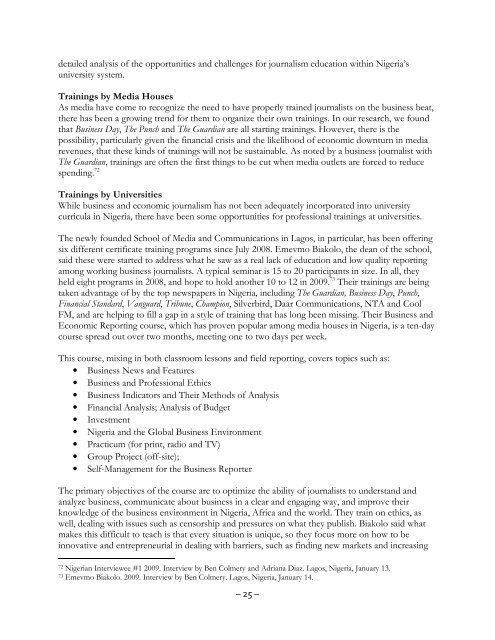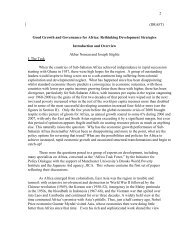THERE WILL BE INK - Initiative for Policy Dialogue
THERE WILL BE INK - Initiative for Policy Dialogue
THERE WILL BE INK - Initiative for Policy Dialogue
You also want an ePaper? Increase the reach of your titles
YUMPU automatically turns print PDFs into web optimized ePapers that Google loves.
detailed analysis of the opportunities and challenges <strong>for</strong> journalism education within Nigeria’suniversity system.Trainings by Media HousesAs media have come to recognize the need to have properly trained journalists on the business beat,there has been a growing trend <strong>for</strong> them to organize their own trainings. In our research, we foundthat Business Day, The Punch and The Guardian are all starting trainings. However, there is thepossibility, particularly given the financial crisis and the likelihood of economic downturn in mediarevenues, that these kinds of trainings will not be sustainable. As noted by a business journalist withThe Guardian, trainings are often the first things to be cut when media outlets are <strong>for</strong>ced to reducespending. 72Trainings by UniversitiesWhile business and economic journalism has not been adequately incorporated into universitycurricula in Nigeria, there have been some opportunities <strong>for</strong> professional trainings at universities.The newly founded School of Media and Communications in Lagos, in particular, has been offeringsix different certificate training programs since July 2008. Emevmo Biakolo, the dean of the school,said these were started to address what he saw as a real lack of education and low quality reportingamong working business journalists. A typical seminar is 15 to 20 participants in size. In all, theyheld eight programs in 2008, and hope to hold another 10 to 12 in 2009. 73 Their trainings are beingtaken advantage of by the top newspapers in Nigeria, including The Guardian, Business Day, Punch,Financial Standard, Vanguard, Tribune, Champion, Silverbird, Daar Communications, NTA and CoolFM, and are helping to fill a gap in a style of training that has long been missing. Their Business andEconomic Reporting course, which has proven popular among media houses in Nigeria, is a ten-daycourse spread out over two months, meeting one to two days per week.This course, mixing in both classroom lessons and field reporting, covers topics such as:• Business News and Features• Business and Professional Ethics• Business Indicators and Their Methods of Analysis• Financial Analysis; Analysis of Budget• Investment• Nigeria and the Global Business Environment• Practicum (<strong>for</strong> print, radio and TV)• Group Project (off-site);• Self-Management <strong>for</strong> the Business ReporterThe primary objectives of the course are to optimize the ability of journalists to understand andanalyze business, communicate about business in a clear and engaging way, and improve theirknowledge of the business environment in Nigeria, Africa and the world. They train on ethics, aswell, dealing with issues such as censorship and pressures on what they publish. Biakolo said whatmakes this difficult to teach is that every situation is unique, so they focus more on how to beinnovative and entrepreneurial in dealing with barriers, such as finding new markets and increasing72 Nigerian Interviewee #1 2009. Interview by Ben Colmery and Adriana Diaz. Lagos, Nigeria, January 13.73 Emevmo Biakolo. 2009. Interview by Ben Colmery. Lagos, Nigeria, January 14.– 25 –














